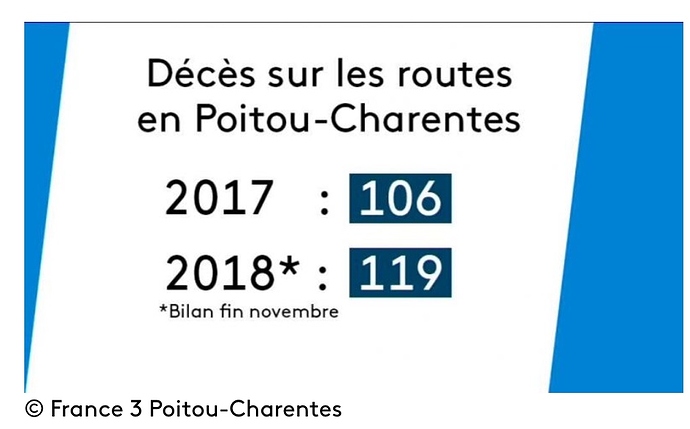Too early for any certainty on the effect of 80kh… surely… 
Deaths in Charente and Deux-Sevres have gone down slightly… yet Charente-Maritime has seen an increase…
as your link says:
Toutefois les causes des accident de la routes restent toujours la vitesse excessive, l’alcool ou encore l’endormissement au volant.
The only way to find the effect would be to be to compare figures on 90kmh roads before the change and figures for those same roads at 80 after the change and that’s not going to happen. However an increase is hardly going to make justifying the change a particularly easy task. A healthy reduction would have been more convincing. A few more years of data will give a better picture but the real cause of the problem has not been addressed by this bizarre action.
A fact: In Germany about 50% of the Autobahns are unrestricted and the speed limit out of built up areas is 100kmh, in France the autoroutes are restricted to a maximum of 130kmh and the national limit is 80kmh. France’s road death figures are significantly worse than Germany’s. Speed itself is not the problem and the 80 limit was never going to be a magical cure.
Dordogne has had a bad year… again excessive/inappropriate speed, alcohol, drugs… have played a large part.
There were (I think) fewer accidents, but with worse consequences…
I also think it’s premature to reach any reliable on the scant data available.
But although I keep to the 80 kph limit on local D roads I am often overtaken by vehicles travelling at high speed using dangerous manouvres to gain a minute’s advantage, and it wouldn’t surprise me if reckless decisions by impatient overtakers were found to be the cause of many accidents since the change.
Together with the national pastime of tailgating. Reckless decisions by impatient overtakers is nothing new, but is it more or less dangerous when the vehicle being overtaken is at 80kph? With electric vehicles overtaking is quicker will that lead to more reckless decisions?
Sadly, IMO there have been and will always be “reckless drivers”, whether it relates to speed or manoeuvrers …
Is there an easy answer… I think not… 
The obvious answer would be to target those drivers and the places where the accidents actually happen.
We still see the same appalling driving on the smaller roads.
If there is a blind bend or the approaching top of hill it seems like a red rag to a bull.
The fact that we are now going slower does not help.
Quite so, David… accidents & deaths are up in the Dordogne…and in that Dept… I think, more than 80% of the speed cameras are not working, due to vandalism… 
Drink and Drugs… mmm… no idea… 

Don’t know about the effect on fatalities ect but our kpl has certainly improved 
But you could have achieved that without a blanket limit.
True-but most people ( including us) wouldn’t -woukd they?
But that’s a freedom of choice.
no noticeable difference what so ever for the time being locally. It’s rare that I get stuck behind a car doing 80kmh, when driving in to and home from work it’s more like motorway speeds and I’m not the only one 
The higher the speed if you unfortunately hit something the higher the damage.
Keeping to the speed limit of 80 should mean a little less damage and pollution.
If they want to use a national speed limit to reduce pollution it should be sold as that. I’m sure your damage theory will work in a few situations but I wonder how many accidents actually happen at exactly the National limit. I’m collecting a car next week after repairs to it after an accident. It was stopped at the time of the collision and the trailer that hit it was probably travelling at at least 10kmh. The repair bill is €17,000, I’m not sure that speed always has much to do with damage. If the two vehicles had been on a wide, open, empty N road the accident wouldn’t have happened. Appropriate speed is the important thing.
I’ve not noticed many of my fellow motorists sticking to the new limit, and it is, in fact, not that easy, since many modern vehicles now have six gears and, even in the case of my 3.5 tonne van, you don’t shift to sixth gear until you hit 80; my wife’s Ford would be labouring in sixth at 80 and that is NOT efficient NOR economical: an engine does NOT run economically when it’s not allowed to function at its designed optimum, and being constrained to run in a lower gear will use more juice, not less. In fact I have seen a protest joke on a motard’s leather jacket, “Cinquième et sixième vitesses à vendre.”
So, most of the folks locally largely ignore the new limit, but I have found drivers getting very impatient whilst stuck behind those who do adhere to the law; that’s certain to cause more accidents than before, not fewer.
I think it’s a pointless and badly thought out law: it would have made more sense to simply put more specific limit signs up in areas where they were necessary and leave the open roads at 90.
Excellent - so in the spped limit roundels put the words Appropriate Speed - good luck with this!
On this issue David I don’t agree with your comments or at least I don’t consider them realistic.
(this comes from a background of working as a Traffic Engineer in a past career).
What a bizarre answer. I can think of many places where the appropriate speed is far less than the legal speed limit. Appropriate speed is key. The 80 kmh limit is not appropriate for modern vehicles on modern roads 99% of the time. I’m not sure what writing your CV is hoping to prove because I really don’t understand what you are getting at.
